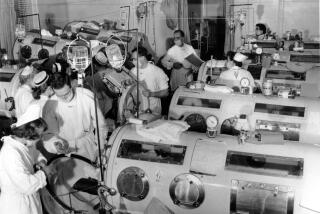Vaccine Injury Compensation Plan Urged to Maintain Production Despite Lawsuits
- Share via
WASHINGTON — The National Academy of Sciences, saying that the “precarious nature” of the nation’s vaccine supply constitutes a “threat to the public’s health,” called Monday for a new vaccine injury compensation system intended to prevent manufacturers who fear excessive lawsuits from ceasing production.
“In some cases, juries have made large awards--this makes a company’s gamble in vaccine production very high,” said the study panel’s chairman, Dr. Jay P. Sanford of the Pentagon’s Uniformed Services University of the Health Sciences.
“In the company’s view, sometimes the only satisfactory way to reduce the commercial risk is to stop making the vaccine,” Sanford explained. “We concluded that the uncertainty faced by manufacturers with regard to liability must be reduced.”
Two-Year Study
The academy, releasing a two-year study on the nation’s vaccine supply, recommended also the creation of a national commission to develop “an effective and socially responsible” vaccine policy.
“One of the commission’s principal tasks would be to anticipate vaccine needs and problems that might interfere with supply,” Sanford said. “It would also monitor the whole range of vaccine development, production and use, ranging from disseminating information . . . for creating safer or cheaper vaccines to promoting broader use of vaccines among adults or high-risk groups.”
Although the government has made limited efforts to stockpile essential vaccines in the event supply is disrupted, he said, “the small stockpile cannot protect the public against a company’s decision to stop manufacturing a vaccine altogether.”
Moreover, Sanford said that the study group had failed to find any contingency plan for dealing with a manufacturer’s decision to halt production of a vaccine for children. “We consider this a grave situation,” he said.
Rapid Compensation
The study panel, composed of representatives of medical schools, business and government, said that an alternative compensation system should provide “reasonable compensation in a rapid and equitable manner” to those injured by properly manufactured and labeled vaccines. But “we do not want compensation to protect a company or individual suspected of misconduct,” it stressed.
Claims filed under the current tort system, the study said, require “an extended, costly and complex adjudicative procedure,” with results that are often “erratic and unpredictable--and therefore inequitable.” It said that the establishment of a compensation fund for injured parties would help them “not feel that their only hope lies with the courts.”
In an informal survey, the study found more than 200 lawsuits pending against vaccine manufacturers, reporting that “two manufacturers indicated a sharp increase in the number of claims filed” over previous years. Only a few suits had been settled, some for amounts averaging $1 million, while some manufacturers had incurred annual legal costs of up to several million dollars, the study said.
Other alternatives noted by the panel include a supplementary compensation system that would operate in conjunction with the current tort system, or with some restrictions on tort law as it applies to vaccine injury. In addition, the federal government could assume liability or a public insurance program could guarantee vaccine supply, the study said.
Risk Small
“No vaccine is without some risk--fortunately, the risk is small,” Sanford said. “But it does exist.”
Vaccine availability is often vulnerable because only a few commercial manufacturers and distributors are responsible for the most widely used vaccines, the study said. Only three companies distribute the seven vaccines recommended for routine immunization of children, and most of them, according to Sanford, are produced by a single manufacturer. Those vaccines protect against polio, measles, mumps, rubella, diphtheria, tetanus and pertussis, or whooping cough.
Earlier this year, a shortage of DTP (diphtheria, tetanus and pertussis) vaccine occurred when two manufacturers discontinued distribution after they had difficulty in obtaining liability coverage. At the same time, supplies from the only remaining manufacturer were hampered by technical production problems.
“That particular shortage was relieved recently when one of the firms decided to return to the market,” Sanford said. “But it brought home just how precarious our vaccine supply is.”
More to Read
Sign up for Essential California
The most important California stories and recommendations in your inbox every morning.
You may occasionally receive promotional content from the Los Angeles Times.












